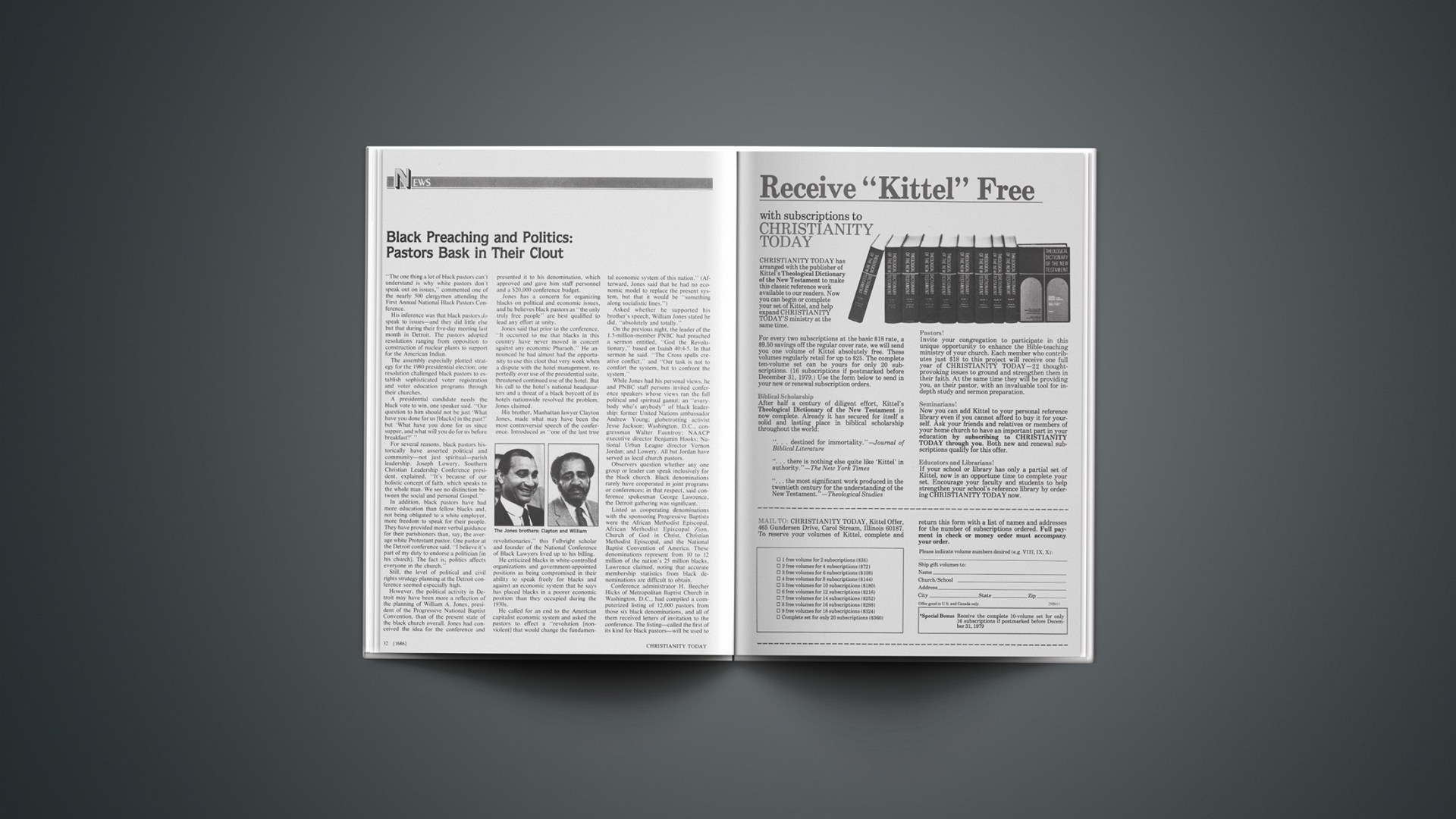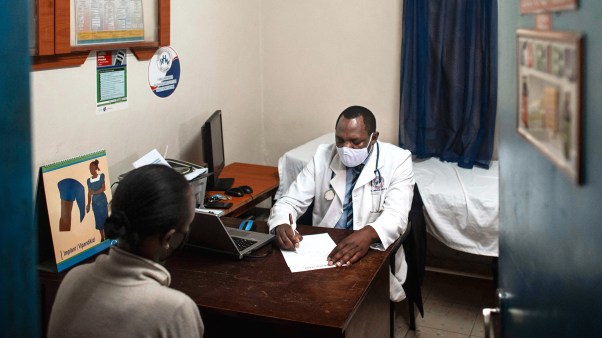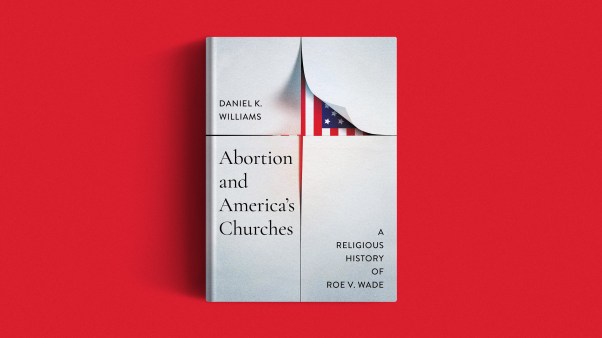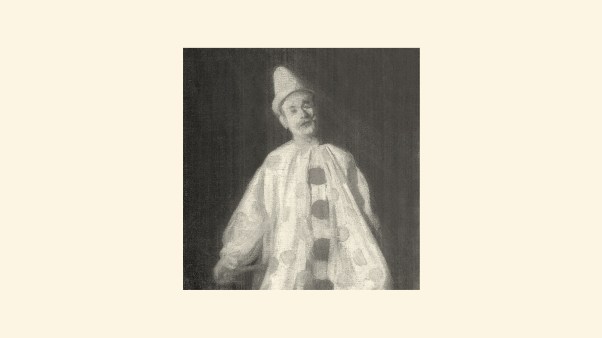“The one thing a lot of black pastors can’t understand is why white pastors don’t speak out on issues,” commented one of the nearly 500 clergymen attending the First Annual National Black Pastors Conference.
His inference was that black pastors do speak to issues—and they did little else but that during their five-day meeting last month in Detroit. The pastors adopted resolutions ranging from opposition to construction of nuclear plants to support for the American Indian.
The assembly especially plotted strategy for the 1980 presidential election; one resolution challenged black pastors to establish sophisticated voter registration and voter education programs through their churches.
A presidential candidate needs the black vote to win, one speaker said. “Our question to him should not be just ‘What have you done for us [blacks] in the past?’ but ‘What have you done for us since supper, and what will you do for us before breakfast?’ ”
For several reasons, black pastors historically have asserted political and community—not just spiritual—parish leadership. Joseph Lowery, Southern Christian Leadership Conference president, explained, “It’s because of our holistic concept of faith, which speaks to the whole man. We see no distinction between the social and personal Gospel.”
In addition, black pastors have had more education than fellow blacks and, not being obligated to a white employer, more freedom to speak for their people. They have provided more verbal guidance for their parishioners than, say, the average white Protestant pastor. One pastor at the Detroit conference said, “I believe it’s part of my duty to endorse a politician [in his church]. The fact is, politics affects everyone in the church.”
Still, the level of political and civil rights strategy planning at the Detroit conference seemed especially high.
However, the political activity in Detroit may have been more a reflection of the planning of William A. Jones, president of the Progressive National Baptist Convention, than of the present state of the black church overall. Jones had conceived the idea for the conference and presented it to his denomination, which approved and gave him staff personnel and a $20,000 conference budget.
Jones has a concern for organizing blacks on political and economic issues, and he believes black pastors as “the only truly free people” are best qualified to lead any effort at unity.
Jones said that prior to the conference, “It occurred to me that blacks in this country have never moved in concert against any economic Pharaoh.” He announced he had almost had the opportunity to use this clout that very week when a dispute with the hotel management, reportedly over use of the presidential suite, threatened continued use of the hotel. But his call to the hotel’s national headquarters and a threat of a black boycott of its hotels nationwide resolved the problem, Jones claimed.
His brother, Manhattan lawyer Clayton Jones, made what may have been the most controversial speech of the conference. Introduced as “one of the last true revolutionaries,” this Fulbright scholar and founder of the National Conference of Black Lawyers lived up to his billing.
He criticized blacks in white-controlled organizations and government-appointed positions as being compromised in their ability to speak freely for blacks and against an economic system that he says has placed blacks in a poorer economic position than they occupied during the 1930s.
He called for an end to the American capitalist economic system and asked the pastors to effect a “revolution [nonviolent] that would change the fundamental economic system of this nation.” (Afterward, Jones said that he had no economic model to replace the present system, but that it would be “something along socialistic lines.”)
Asked whether he supported his brother’s speech, William Jones stated he did, “absolutely and totally.”
On the previous night, the leader of the 1.5-million-member PNBC had preached a sermon entitled, “God the Revolutionary,” based on Isaiah 40:4–5. In that sermon he said. “The Cross spells creative conflict,” and “Our task is not to comfort the system, but to confront the system.”
While Jones had his personal views, he and PNBC staff persons invited conference speakers whose views ran the full political and spiritual gamut; an “everybody who’s anybody” of black leadership: former United Nations ambassador Andrew Young; globetrotting activist Jesse Jackson; Washington, D.C., congressman Walter Fauntroy; NAACP executive director Benjamin Hooks; National Urban League director Vernon Jordan; and Lowery. All but Jordan have served as local church pastors.
Observers question whether any one group or leader can speak inclusively for the black church. Black denominations rarely have cooperated in joint programs or conferences; in that respect, said conference spokesman George Lawrence, the Detroit gathering was significant.
Listed as cooperating denominations with the sponsoring Progressive Baptists were the African Methodist Episcopal, African Methodist Episcopal Zion, Church of God in Christ, Christian Methodist Episcopal, and the National Baptist Convention of America. These denominations represent from 10 to 12 million of the nation’s 25 million blacks, Lawrence claimed, noting that accurate membership statistics from black denominations are difficult to obtain.
Conference administrator H. Beecher Hicks of Metropolitan Baptist Church in Washington, D.C., had compiled a computerized listing of 12,000 pastors from those six black denominations, and all of them received letters of invitation to the conference. The listing—called the first of its kind for black pastors—will be used to contact black pastors regarding future political and economic action, said conference organizers.
Conspicuous by its absence from the list of cooperating churches was the largest of the seven major black denominations: the 6.5-million-member National Baptist Convention, U.S.A. The denomination was represented at the conference, as were 12 overall, including Seventh-day Adventists, a few Roman Catholics (there are 1 million black Catholics), Pentecostals, and mainline denominations. However, the NBCUSA leadership withheld its official blessing.
Long-time NBCUSA president Joseph Jackson, pastor of the 2,000-member Olivet Baptist Church in Chicago, could not be reached for comment. But Jackson, whose within-the-system approach to equal rights causes has angered black activists, may have felt uncomfortable with the attitude of the conference.
For the most part, Jones ran the show and nobody seemed to mind. He appointed the resolutions committee, which reworked a list of suggested resolutions that had been prepared even before the conference began (markedly similar to those passed by Jones’s denomination last summer).
A second black pastors conference was scheduled for June 1980, when the group could have an impact on, and speak to, the various presidential and other candidates for office.
In addition to the civil rights and political preachments, the pastors attended daily worship services and morning meditations. Conference organizers had invited preachers from all seven black denominations, who gave rousing sermons in vintage black preaching tradition.
Church of God in Christ pastor F. D. Washington of Brooklyn soaked two handkerchiefs with perspiration during a 45-minute exhortation. As the pastors registered approval with “Say so,” “Preach it,” and “Lift it up,” Washington told them: “Preach the Word, preach the Word …”
African Methodist Episcopal Zion bishop Alfred Danston cautioned blacks not to blame all their problems on whites and the white church: “We don’t need to blame white folks because black folks rape and kill each other.” He said, “We’ve got to teach our own people to deal with their problems within.”
In interviews, some pastors rejected an approach to solving blacks’ problems as radical as Clayton Jones’s. However, many shared his concern that something needs to be done to improve the plight of blacks in America. Several said they appreciated the information gained from conference speakers; there appeared to be as many cassette recorders as Bibles. They hadn’t traveled to Detroit on a whim: Pastor Oscar Lomax of Chicago, noting the $5 breakfast, $10 luncheon, and hotel lodging costs, said “Many of us came here at great sacrifice.”
With so many voices in the black church, the bottom line in Detroit was blackness. One pastor reminded his audience: “Even if you live to be 90, when you go to bed at night, you will be black, and when you get up in the morning, you’re still going to be black.” Another said, “The blood that unites us is stronger than the waters that divide us.”
In a roller coaster, emotional oration that had the entire audience on its feet, Jesse Jackson said, “No one will save us for us, but us.”
The National Council Of Churches
Mulling Over Criminal Justice and Church Union
Some critics of the National Council of Churches say the council is too quick to issue social statements, while giving only lip service to its theological underpinnings.
But at its semiannual meeting in New York in November, when the 266-member Governing Board of the 32-denomination agency finally approved the policy statement on the “injustice of the criminal justice system,” it was only after much debate, especially about theology.
The document says there is “ample evidence” that the U.S. criminal justice system is “unfair, inequitable, unjust … in some instances itself illegal” and “one of the most punitive in the world.” It has been misused to “suppress nonviolent political dissent … cope with social problems, and … provide cheap labor.”
The statement would preclude the death penalty and require “formal, legally prescribed demonstration that no acceptable alternative exists” to incarceration.
The motif of the theological section, about a fifth of the statement, is that “in the covenant of love that creates community, God establishes justice/righteousness as the structural norm.”
The document and its theology were warmly supported by several denominational executives on the NCC board, among them president Avery Post of the United Church of Christ, and general secretary Arie Brouwer of the Reformed Church in America.
But some board members, especially Lutherans and Orthodox, were unhappy with the theology. President James Crumley of the Lutheran Church in America said LCA representatives “have objected … all the way through the development of the paper and were really never listened to.”
William Rusch, LCA ecumenical concerns director, complained that the theological section “expresses theology in the terminology of one particular Christian tradition” rather than an ecumenical theology that “transcends these traditions.…”
“Justice is something you can expect from society; righteousness is a religious term, which has to do with redemption. It’s like mixing apples and oranges.” He said it “confuses sociology and theology.”
The effort to delete lost by roughly a 2-to-1 margin.
Later in the course of the nearly five-hour debate, UCC representative W. Sterling Cary suggested that if faithfulness to theological tradition “silences the voice of God, that is blasphemy.” He added his suspicion, to which some other board members took exception, that “some of our hesitancy is not theologically inspired.”
In the end, the document passed 72-to-17, with seven abstentions.
Later, NCC general secretary Claire Randall (United Presbyterian) said the council is “taking theology much more seriously.” She said the NCC would “review our prophecies” so that in the future, all theological approaches are adequately represented as documents are developed. A quest for an ecumenical theology, she said, should not be “least-common-denominator” theology.
The board may have a chance to test all that at its meeting next November. Then it is to act on possible constitutional changes in light of denominational reactions to two documents that project the vision of the NCC as a “communion of churches.”
“Received and transmitted” by the board, the documents are results of a two-year study by a special panel.
Introducing the report, president Paul Crow of the Disciples of Christ Council on Christian Unity said they call for “new dimensions of commitment,” movement “beyond reluctant minimal relationships” toward “maximal ecumenism” and “visible unity.”
Related to the documents are proposed changes that would amend the preamble of the NCC constitution and completely rewrite Article Two to make the NCC’s purpose “to call the churches to visible unity in Christ as a sign of the unity of humankind and to enable the churches to act responsibly together in living out that wholeness in witness and service to the world.”
Discussion of the Middle East and the potential strain of a debate over Christian-Jewish relations, was in large measure postponed until the board meeting in May.
In the meantime there is to be a series of hearings and a trip to the Middle East this winter by a special panel of NCC officers and heads of member denominations.
Concurrently, a separate Middle East policy review committee is to draft an NCC policy statement for first reading at the May meeting. Among the issues to be dealt with is formal U.S. recognition of the Palestinian Liberation Organization.
TOM DORRIS
North American Scene
Holiness churches should reconsider their traditional hard-line stance against Pentecostalism and the charismatic movement, Free Methodist author Howard Snyder told about 200 scholars at the recent annual meeting of the Wesleyan Theological Society. That position has blocked a proper emphasis on spiritual gifts and a properly “charismatic” view of the church as rooted in grace and committed to mutual ministry of all members, Snyder said. His paper received a mixed, but generally favorable reaction, which might indicate a historic shift at least in scholarly attitude. Speaking in tongues can lead to immediate excommunication in such Holiness bodies as the Wesleyan Church and the Church of the Nazarene.
Elvis Presley was recalled in song, but not in spirit, in Portland, Oregon, last month. Portland area churchmen successfully protested against a much-publicized “world’s largest seance,” to have been conducted by clairvoyant Mickie Dahne at the conclusion of the “Elvis Experiment,” a benefit concert with Elvis look-alikes, sponsored by two Portland radio stations. Concert organizers cancelled the seance after the protests, and also because of alleged death threats against Dahne and themselves. In lieu of the seance, Dahne talked to the concert audience of 5,000 about “astrology, love, and the Presley death.”
Spending of city funds for Pope John Paul II’s speaker’s platform in Philadelphia violated the First Amendment, U.S. District Court Judge Raymond J. Broderick ruled last month. He ordered the city to seek $204,000 reimbursement from the Philadelphia archdiocese, which had said it would pay costs for the platform if the courts so ruled. Mayor Frank Rizzo had defended the city’s expenditure, saying the Pope was a “head of state” and the city was responsible for such visits. The American Civil Liberties Union and the American Baptist Church had contested the city’s outlay of funds.
The United Methodist Church’s highest legal agency last month upheld the appointment of practicing homosexual Paul Abels as pastor of New York City’s Washington Square Church. The nine-member judicial council declined to rule on the larger question of ordination of practicing homosexuals. United Methodist Social Principles call the practice of homosexuality “incompatible with Christian teaching.” However, the council noted UM Book of Discipline paragraphs that allow appointment of all ministerial candidates who are members in good standing of an annual conference; it said a minister can lose his or her good standing only by action of that conference.
Carl McIntire last month paid the city of Cape May, New Jersey, almost $30,000 in back taxes owed on eight properties—avoiding foreclosure. McIntire recently lost two appeals of court rulings, and has been ordered to pay five and eight years’ back taxes on his Christian Admiral Hotel and Shelton College, respectively. City officials said the controversial preacher previously had not begun to pay any of the nearly $500,000 in back taxes owed on the two structures.










